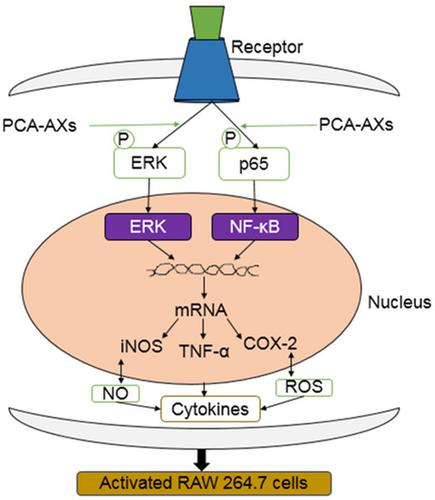当前位置:
X-MOL 学术
›
J. Food Biochem.
›
论文详情
Our official English website, www.x-mol.net, welcomes your
feedback! (Note: you will need to create a separate account there.)
Phenolic acid bound arabinoxylans extracted from Little and Kodo millets modulate immune system mediators and pathways in RAW 264.7 cells
Journal of Food Biochemistry ( IF 3.5 ) Pub Date : 2020-11-15 , DOI: 10.1111/jfbc.13563 Aswini Srinivasan 1 , Jenifer Aruldhas 2 , Senthamil Selvan Perumal 1 , Sanmuga Priya Ekambaram 1
Journal of Food Biochemistry ( IF 3.5 ) Pub Date : 2020-11-15 , DOI: 10.1111/jfbc.13563 Aswini Srinivasan 1 , Jenifer Aruldhas 2 , Senthamil Selvan Perumal 1 , Sanmuga Priya Ekambaram 1
Affiliation

|
The immunomodulating effect of Phenolic acid bound arabinoxylans (PCA‐AXs) extracted from Little (PCA‐AX‐L) and Kodo (PCA‐AX‐K) millet seeds in RAW 264.7 cells were investigated. The PCA‐AXs were extracted from millets and their chemical characterization were carried out by GC‐MS, HPLC, and FT‐IR. The immunomodulatory effect of PCA‐AXs in RAW 264.7 cells were investigated by estimating ROS, NO, and cytokines TNF‐α, IL‐1β, IL‐6, and evaluation of molecular mechanism by q‐PCR & western blotting techniques. The xylose: arabinose ratio of PCA‐AX‐L and PCA‐AX‐K were 1.48:1.0 and 2.26:1.0, respectively. The phenolic acids content was higher in PCA‐AX‐K than PCA‐AX‐L determined by HPLC. FT‐IR analysis confirms the presence of α‐glucosidic linkage with the degree of substitution of xylan backbone by arabinose residues. The evaluation of immunomodulating effect of PCA‐AXs revealed that the PCA‐AX‐L–treated cells showed higher release of NO, ROS and cytokines than PCA‐AX‐K–treated cells. The mRNA expressions of TNF‐α, iNOS and COX‐2 were upregulated by PCA‐AX‐L and downregulated by PCA‐AX‐K in dose‐dependent manner. Furthermore, in western blotting, the ERK and NF‐κB were found to be activated by PCA‐AX‐L and inhibited by PCA‐AX‐K. Our findings suggest that the high branched arabinoxylans of PCA‐AX‐L could modulate the immune response in RAW 264.7 cells through activation of ERK and NF‐κB signaling pathways and acts as an immunostimulant. The higher phenolic content in PCA‐AX‐K could modulate the immune response by downregulation of ERK and NF‐κB signaling pathways and thus, it could act as an immunomodulator.
中文翻译:

从Little和Kodo小米中提取的与苯酚酸结合的阿拉伯木聚糖可调节RAW 264.7细胞中的免疫系统介质和途径
研究了从Little(PCA-AX-L)和Kodo(PCA-AX-K)小米种子中提取的酚酸结合的阿拉伯木聚糖(PCA-AXs)在RAW 264.7细胞中的免疫调节作用。从小米中提取PCA-AXs,并通过GC-MS,HPLC和FT-IR对它们进行化学表征。通过估计ROS,NO和细胞因子TNF-α,IL-1β,IL-6并通过q-PCR和Western印迹技术评估分子机制,研究了PCA-AXs在RAW 264.7细胞中的免疫调节作用。PCA‐AX‐L和PCA‐AX‐K的木糖:阿拉伯糖比率分别为1.48:1.0和2.26:1.0。HPLC测定的PCA-AX-K中的酚酸含量高于PCA-AX-L。FT-IR分析证实存在α-糖苷键,其具有木聚糖骨架被阿拉伯糖残基取代的程度。对PCA-AXs免疫调节作用的评估表明,与PCA-AX-K处理的细胞相比,PCA-AX-L处理的细胞显示出更高的NO,ROS和细胞因子释放。TNF-α,iNOS和COX-2的mRNA表达被PCA-AX-L上调,而PCA-AX-K则呈剂量依赖性。此外,在蛋白质印迹中,发现ERK和NF-κB被PCA-AX-L激活并被PCA-AX-K抑制。我们的发现表明PCA‐AX‐L的高分支阿拉伯木聚糖可以通过激活ERK和NF‐κB信号通路来调节RAW 264.7细胞的免疫反应,并起到免疫刺激作用。PCA‐AX‐K中较高的酚含量可以通过下调ERK和NF‐κB信号通路来调节免疫反应,因此可以充当免疫调节剂。
更新日期:2021-01-19
中文翻译:

从Little和Kodo小米中提取的与苯酚酸结合的阿拉伯木聚糖可调节RAW 264.7细胞中的免疫系统介质和途径
研究了从Little(PCA-AX-L)和Kodo(PCA-AX-K)小米种子中提取的酚酸结合的阿拉伯木聚糖(PCA-AXs)在RAW 264.7细胞中的免疫调节作用。从小米中提取PCA-AXs,并通过GC-MS,HPLC和FT-IR对它们进行化学表征。通过估计ROS,NO和细胞因子TNF-α,IL-1β,IL-6并通过q-PCR和Western印迹技术评估分子机制,研究了PCA-AXs在RAW 264.7细胞中的免疫调节作用。PCA‐AX‐L和PCA‐AX‐K的木糖:阿拉伯糖比率分别为1.48:1.0和2.26:1.0。HPLC测定的PCA-AX-K中的酚酸含量高于PCA-AX-L。FT-IR分析证实存在α-糖苷键,其具有木聚糖骨架被阿拉伯糖残基取代的程度。对PCA-AXs免疫调节作用的评估表明,与PCA-AX-K处理的细胞相比,PCA-AX-L处理的细胞显示出更高的NO,ROS和细胞因子释放。TNF-α,iNOS和COX-2的mRNA表达被PCA-AX-L上调,而PCA-AX-K则呈剂量依赖性。此外,在蛋白质印迹中,发现ERK和NF-κB被PCA-AX-L激活并被PCA-AX-K抑制。我们的发现表明PCA‐AX‐L的高分支阿拉伯木聚糖可以通过激活ERK和NF‐κB信号通路来调节RAW 264.7细胞的免疫反应,并起到免疫刺激作用。PCA‐AX‐K中较高的酚含量可以通过下调ERK和NF‐κB信号通路来调节免疫反应,因此可以充当免疫调节剂。











































 京公网安备 11010802027423号
京公网安备 11010802027423号